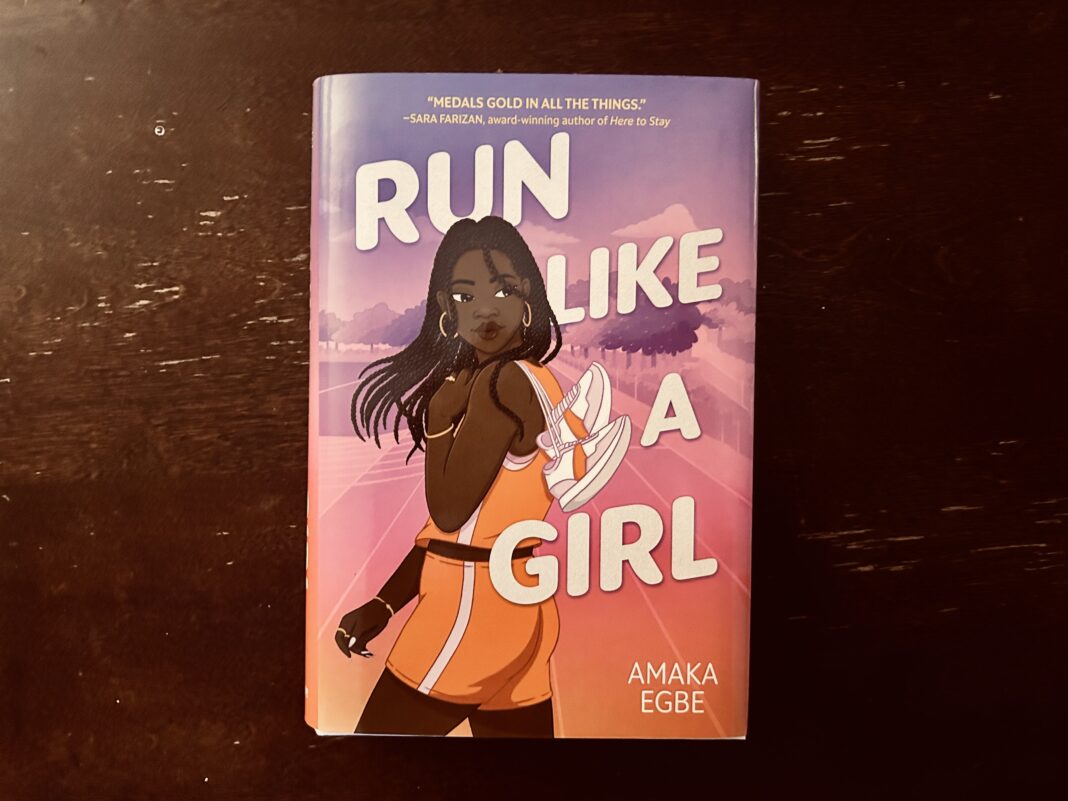In her debut novel, Amaka Egbe writes the story of a young Black girl, and new reality as her life is sprung into chaos after moving in with her estranged father.
Before delving into this review of author Amaka Egbe’s ‘Run Like A Girl’, I would like to take a moment to thank those who sent this book. Being given the chance to read it was a privilege, and I’m grateful for such an opportunity. Getting to experience a story like this, and to be exposed to such an amazing book is truly special.
Amaka Egbe’s debut YA novel ‘Run Like A Girl’ follows protagonist Dera Edwards through her transition from the familiarity of her childhood home with her mother, to the new predominantly white suburbs of West Harmony to live with her distant, emotionally unavailable father. As an athlete, Dera finds partial solace in the chance to continue her pursuit of her Olympic track dreams at her new school, until she is crushed when told her new school doesn’t have a girls track team. Shocked, Dera decides to take a leap of faith by joining the boys track team instead, where she quickly realizes her new teammates are much less than welcoming.
Now as the only girl on the team, Dera navigates the newfound challenges of such judgement, pressure, and social isolation as one of the only Black girls in the school. To fend off the rumors and challenge how she’s seen at her new school, Dera teams up with school journalist Rosalyn, to change her narrative through a feature in her blog, as well as to maybe get closer to Rosalyn’s cousin, Gael. As Dera fights for space on the track team and within her own life, she journeys through highschool while dealing with the weight of reconnecting with her absent father, learning the complicated truth of her parents divorce, fighting through her new online fame, and figuring out her feelings towards Gael, her fellow track star with his own story to tell.
For me, this story was a thoughtful reminder of the constant struggle of young girls, specifically young girls of color and their journey to overcome the struggle of overcoming perceived notions, and stereotypes to grow into their identity. Dera, a young Nigerian girl, faces new pressure from an environment where she is constantly questioned, whether from within her school as the only girl on a boys team or to her home where her father lacks emotional availability for her. Dera is written as a complex and strong female lead, who pushes the bounds of her expectations, her running capabilities, to pursue her sport with determination. Winning her first race was the moment, her character challenged her belonging, that said somehow she didn’t fit on this team, or simply that girls couldn’t compete at HER level.
What sets this book apart from other YA novels is its portrayal of family. More often than not, YA novels avoid overcomplicated family structure or oversimplify complex emotions felt when discussing the struggle of divorced parents, or an absent figure. This book didn’t, Dera’s parents are clearly divorced, and we are brought through Dera’s emotions and thoughts behind each day, and her parents’ choices. To Dera, her mother is familiar and comfortable, but her father, who she didn’t grow up with, is often awkward and isolated from Dera. For many immigrant children, and children who deal with unique family structures and circumstances, this is reality, with children like Dera stuck between adults who have their own history. A history Dera hoped to find, and that shaped how she saw herself. This representation is often not seen in YA reads, and is more than accurate and truthful, and allows for readers to view Dera’s progression through understanding her parents, and her father in particular.
Most of all, this book speaks to girls, and particularly young girls of color who are told to shrink or change themselves entirely to fit into spaces where they are questioned. The title Run Like A Girl flips a phrase that’s been used as an insult and turns it into something empowering.This phrase doesn’t ask Dera to reject that she is a girl, it asks her to embrace it and stay true to herself. The author reminds us that being a girl is not something to overcome, but is a gift and identity. Dera’s story isn’t about proving she’s as good as the boys, but that she was already enough, and always was.
Overall, I highly recommend this book to anyone who loves an inspirational, feel-good read that doesn’t sugarcoat the truth. It’s a story about growth, identity, and showing up for yourself, even when everyone around you is hoping you’ll give up. It’s a reminder that being a girl isn’t a limitation. It’s a reason to run harder, faster, and louder. To Run Like A Girl, and be proud of it!

